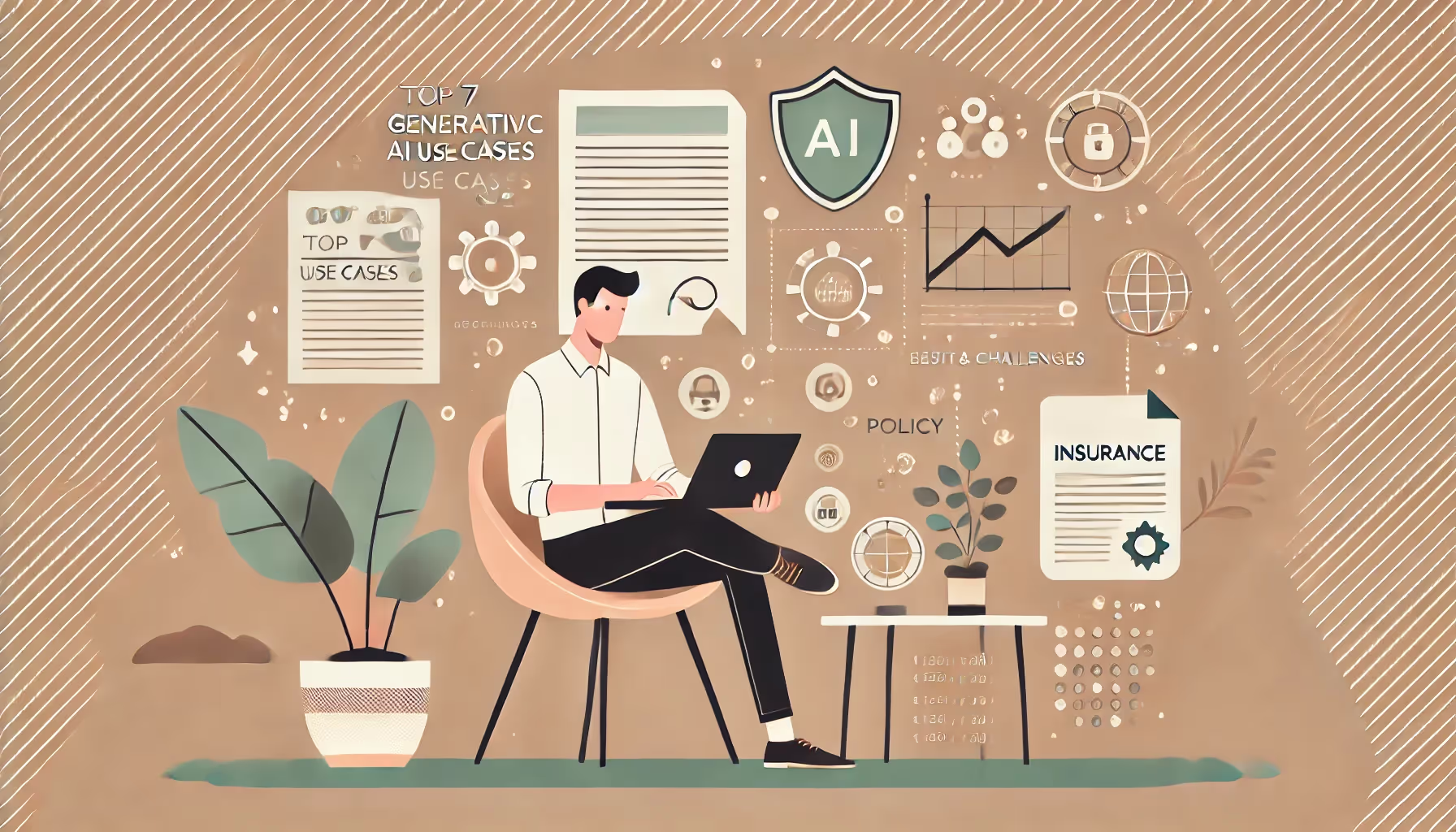Generative AI is rapidly transforming the insurance industry, offering innovative solutions that optimize operations, manage risks, and deliver highly personalized customer experiences. As the demand for advanced technology grows, gen AI use cases in insurance are helping companies revolutionize their services, reduce operational costs, and stay competitive.
This blog will explore the top 7-gen AI use cases in the insurance industry, highlighting the benefits and challenges of adopting these advanced technologies. From automated claims processing to personalized marketing, AI is reshaping how insurance companies operate and thrive in today’s competitive market.
Why is Generative AI Important in the Insurance Industry?
The insurance industry relies on data for risk assessment, claims, and customer engagement. Gen AI in insurance takes these processes to the next level by helping companies make better decisions, automate repetitive tasks, and improve service. As Gen AI use cases in insurance grow, the industry sees colossal efficiency, customer satisfaction, and overall performance gains.
Here are the key benefits of Gen AI use cases in insurance:
- Data-Driven Decisions: AI can analyze massive amounts of data and produce accurate predictions for risk assessment.
- Automation: Repetitive tasks like claims and underwriting can be fully automated, leaving more time for complex work.
- Personalization: Generative AI in the insurance industry helps insurers offer highly personalized policies and services, improving customer satisfaction and retention.
The importance of gen AI in insurance cannot be overstated. By enhancing operational efficiency, improving customer experiences, and driving innovation, generative AI applications in insurance are transforming the industry.
Top 7 Gen AI Use Cases in Insurance
Gen AI is changing how insurers work. Here are the top 7 Gen AI use cases in insurance, showing how Gen AI can simplify processes, improve accuracy, and enhance customer interactions.
- Automated Claims Processing
One of the most prominent Gen AI use cases in insurance is automated claims. Claims have always been a manual, time-consuming process, but with Gen AI in insurance, the whole process can be automated from start to finish. This means customers need more time for claims to be settled.
Example: Lemonade Insurance, a leading AI-powered company, processes claims in just a few minutes using its AI-driven platform. By analyzing claims data, the system can detect fraud, approve claims, and issue payouts almost instantly, transforming the Gen AI use cases in insurance into practical, real-world solutions.
Benefits:
- AI-powered tools assess claims faster and more accurately, reducing payout times and improving customer satisfaction.
- Automating claims processing minimizes human errors, ensuring more reliable outcomes.
- Insurers can process more claims in less time, improving overall efficiency.
Automating claims processing with generative AI in the insurance industry streamlines operations and significantly enhances the customer experience. Next, we will explore how AI transforms personalized underwriting and risk assessment.
- Personalized Underwriting and Risk Assessment
Personalized underwriting is another area where Gen AI in insurance is making big progress. Gen AI use cases in the insurance industry can analyze individual customer data, including behavior and historical data, to generate accurate and personalized risk profiles, insurers can then offer more tailored policies.
Example: Zurich Insurance uses AI-powered underwriting tools to assess risk profiles faster and more precisely. The AI system analyses large datasets from multiple sources and creates personalized pricing models based on real-time risk factors.
Benefits:
- AI processes vast amounts of data for more accurate risk assessments, leading to fairer and more competitive customer pricing.
- Personalized risk assessments enable insurers to craft policies that align with the individual needs of their clients.
- Automating underwriting using Gen AI in the insurance industry speeds up the process, improving customer satisfaction and operational efficiency.
Gen AI in insurance is changing underwriting to be faster, more personalized, and more accurate. But AI is also great at detecting and preventing fraud, one of the biggest problems in insurance.
- Fraud Detection and Prevention
Fraudulent claims cost the industry billions every year. Generative AI in the insurance industry is changing how companies detect and prevent fraud by looking at data patterns and anomalies that might indicate fraud.
Example: Shift Technology, a startup specializing in AI for fraud detection, works with insurers like AXA to identify and prevent fraud. Their AI systems analyze vast amounts of claims data, flagging unusual patterns that human agents might miss, saving insurers millions in fraudulent payouts.
Benefits:
- AI rapidly identifies suspicious patterns in claims data, preventing fraudulent payouts before they happen.
- Machine learning allows AI to continuously improve its fraud detection abilities, staying ahead of emerging fraud tactics.
- Reducing fraud helps insurers save money, maintain fair pricing, and protect their bottom line.
Fraud detection is one of the most critical next-Gen AI use cases in insurance, safeguarding companies from financial losses. Beyond fraud detection, AI is also enhancing customer service through virtual assistants, voicebots, and AI-driven support.
- Virtual Assistants and Customer Support
Generative AI applications in insurance are having a big impact on customer service. AI-powered virtual assistants provide 24/7 customer support, handling routine questions and delivering faster, more accurate answers.
Example: Allianz Insurance uses AI-powered virtual assistants to handle customer queries, from policy details to claim statuses. These bots help reduce the workload on human agents and improve customer satisfaction by providing instant support.
Benefits:
- Virtual assistants handle routine tasks, allowing human agents to focus on more complex customer issues.
- AI-driven virtual assistants offer 24/7 support, improving customer satisfaction by providing immediate responses.
- AI reduces the need for extensive customer support teams, lowering operational costs.
Virtual assistants powered by Gen AI in the insurance industry are revolutionizing how insurers manage customer service, delivering faster and more efficient support at a lower cost. AI’s predictive analytics capabilities are also helping insurers manage risks more effectively.
- Predictive Analytics for Risk Management
One of the top Gen AI use cases in insurance is predictive analytics for risk management. Generative AI in insurance looks at historical data and predicts future trends so insurers can assess risk better and create better policies.
Example: Progressive Insurance uses predictive analytics to assess customer behavior and adjust real-time premiums. This Gen AI in the insurance industry approach helps the company optimize pricing, improve customer satisfaction, and reduce losses.
Benefits:
- AI can predict high-risk clients or situations, allowing insurers to manage risk proactively.
- Predictive analytics helps insurers adjust their policies in response to emerging trends, minimizing potential financial losses.
- AI-driven risk management leads to more informed decision-making and the creation of more effective insurance policies.
Predictive analytics is transforming how insurers assess and manage risk. Meanwhile, gen AI in insurance is also helping to revolutionize marketing and customer engagement strategies.
- Personalized Marketing and Customer Engagement
Generative AI is changing the face of marketing in the insurance sector, allowing insurers to analyze customer behavior and deliver highly personalized marketing campaigns. Generative AI in insurance means you can create marketing strategies that speak to customers individually.
Example: GEICO Insurance utilizes AI-driven marketing to send personalized offers based on user behavior and preferences. By analyzing browsing history and past interactions, AI helps GEICO target customers with more relevant advertisements.
Benefits:
- AI enables personalized customer communication, increasing the likelihood of conversion and customer retention.
- Insurers can predict customer needs and tailor marketing campaigns accordingly, enhancing the effectiveness of their outreach.
- Personalized marketing builds stronger customer loyalty and boosts engagement by delivering timely, relevant information.
Personalized marketing driven by Gen AI in insurance improves customer loyalty and retention. AI is also revolutionizing product development and policy recommendations, enabling insurers to stay ahead of market trends.
- Policy Recommendations and Product Development
Gen AI in insurance means insurers can recommend new policies and develop products based on customer data and market trends. AI insights can help you spot gaps in the market and create products that meet emerging customer needs.
Example: MetLife Insurance uses AI to recommend personalized policies based on a customer’s unique lifestyle and risk profile. By leveraging Gen AI in the insurance market, MetLife has improved customer satisfaction and developed more tailored insurance products.
Benefits:
- AI recommends new, personalized policies based on customer behavior and preferences, improving the user experience.
- AI-driven product development allows insurers to create new offerings faster and respond to real-time market demands.
- Staying ahead of trends through AI-driven product innovation helps insurers maintain a competitive edge.
As generative AI applications in insurance continue to evolve, they will play a key role in helping insurers develop new products and stay competitive in an ever-changing marketplace.
Challenges and Solutions of Implementing Generative AI in Insurance
While the benefits of Gen AI use cases in insurance are clear, there are several challenges that insurers must address to fully implement AI solutions. Here are the key challenges and some potential solutions:
Overcoming these challenges requires strategic planning and investment. With the right approach, generative AI in the insurance market can be a powerful tool for driving growth and innovation. Let’s now conclude by reflecting on the future of AI in insurance and how it can be integrated into your business.
Conclusion
Gen AI is the future of insurance, and the possibilities are endless for simplifying, managing risk, and delivering personal experiences. From automating claims to driving new product development, the Gen AI use cases in insurance are changing how insurers operate and serve their customers.
However, implementing AI means tackling data privacy, implementation costs, and AI model biases. Insurers who can overcome these hurdles will be ahead of the curve in the competitive insurance market.
Are you ready to transform your insurance operations? Discover how Nurix AI can provide cutting-edge solutions for claims processing, fraud detection, customer engagement, and more.
Let Nurix AI help your business stay ahead of the curve and unlock the full potential of generative AI in the evolving insurance landscape. Try it out now!








%20Designation.avif)

